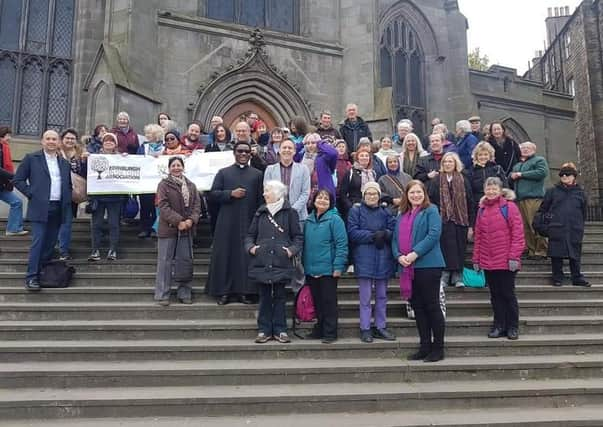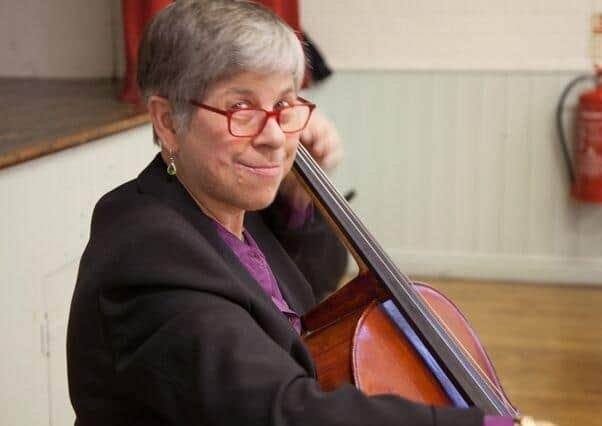Time to Talk offers Scottish care home residents a lifeline


But it has perhaps been most keenly felt by residents in care homes who have been virtually cut off from the rest of the world.
Last week, care homes which had been coronavirus-free for at least 28 days were allowed to finally let visitors back in – albeit with stringent rules to keep everyone safe.
Advertisement
Hide AdAdvertisement
Hide AdSadly, though, some residents do not have family or friends living close by who can easily visit.


That has left care home staff with the far from small task of filling the gap in many of their patient’s lives.
But the frontline staff working in care homes are also stretched at the moment and facing their own challenges – both at work and home – thanks to the virus.
And it’s for that reason a unique project was founded by the Edinburgh Interfaith Association (EIFA).
Advertisement
Hide AdAdvertisement
Hide AdWith funds from the Scottish Government, Time to Talk aims to offer people of all faiths and none the opportunity to talk to someone who can provide a much-needed listening ear.


Residents and their families who are struggling to cope with the Covid-19 pandemic – and the isolation and loneliness it has brought – can call one of the 10 vetted volunteers now working on the helpline – 07519 418451.
Initially, the service was solely for care home residents in Edinburgh and Glasgow; the project team wanted to test the waters.
However, Time to Talk is now available to care home residents across the country.
Advertisement
Hide AdAdvertisement
Hide AdProject manager Dr Claire Garabedian is now keen to spread the word.
She said: “We started off offering the service in the two main cities as we didn’t want to be overwhelmed with calls and not be able to deal with demand.
“However, we always envisaged extending the service to the whole of the country and we are now eager to take calls from residents across Scotland.
“We’re in little doubt that the need is there but, as a new project, it’s been difficult to get the word out there.
Advertisement
Hide AdAdvertisement
Hide Ad“We’ve sent letters and emails to care homes but the managers and staff are very busy doing their jobs so we’re now trying to reach the residents and families, so that they know we’re here.
“The Covid-19 pandemic has hit the care home sector especially hard, with families often unable to visit their loved ones.
“Time to Talk operates seven days a week, from 11am to 7pm, offering care home residents and their family members living in Scotland the chance to be listened to by volunteers via the phone.
“All of our volunteers have been properly vetted for their experience and training as listeners.
Advertisement
Hide AdAdvertisement
Hide Ad“We hope care home residents and their families will gain some solace from talking to someone and that it will also be a support for staff who’re under pressure – taking some of the weight off their shoulders.
“It’s vitally important that residents have someone to talk to as even if they have family close by who they’re in regular contact with, they may not want to air their fears to them.
“By providing a listening ear – we don’t offer advice or counselling – people can express their fears to us, rather than feel like they are worrying their loved ones.”
There have already been some interesting requests; two from the same home.
Advertisement
Hide AdAdvertisement
Hide AdClaire said: “We had a call asking if we had someone who was a Buddhist and could speak Cantonese.
“We do have a Buddhist on the team but they don’t speak Cantonese.
“However, we were able to find a Buddhist chaplain who speaks Cantonese and put them in touch with the care home manager, who was thrilled we were able to help.
“We’re now working with them to help someone who’s had a stroke and is non-verbal. As we offer a phone service, that’s an interesting one for us.
Advertisement
Hide AdAdvertisement
Hide Ad“But my background is helping people living with dementia, using music as a way to enagage with them.
“So we’re going to try a Skype call to interact with them, using some typing and visuals. It’s experimental but we’re willing to give it a try.
“These are two scenarios we hadn’t even thought of when we launched the service but that’s what makes it so interesting.”
While Time to Talk is being offered by EIFA, a multi-faith organisation, people of all faiths – and none – are welcome to use the service. And there’s no need to discuss faith, unless the caller chooses to do so.
Advertisement
Hide AdAdvertisement
Hide AdClaire explained: “The main focus of the service is providing an understanding and empathic listening ear.
“All care home residents and their family members are welcome to make use of the service – be they of a particular faith or atheist.
“However, callers who would like to speak directly to someone of their faith can also be connected through our service.”
EIFA seeks to enable understanding and mutual respect within communities in our capital city.
Advertisement
Hide AdAdvertisement
Hide AdWhen lockdown loomed on the horizon, the group’s executive director Iain Stewart felt they could do something to help.
Time to Talk had been something the group had discussed previously – but not yet acted upon. The pandemic served as a catalyst and the group made a successful bid for funding to the Scottish Government.
Officially launched in June, the funding will last until the end of this month.
However, EIFA and the project manager hope Time to Talk will continue long after lockdown.
Advertisement
Hide AdAdvertisement
Hide AdClaire added: “Like any new project, we’re still finding our feet but we’re in little doubt that there is a need for this service and not just during lockdown.
“Isolation and loneliness sadly exist in care home settings, regardless of the current pandemic.
“We’re hopeful that, if we can prove the need is there, the project will receive additional funding to enable us to continue after our initial funding period at the end of this month.
“It’s difficult to establish a service in such a short period of time but we’ve already seen that it works.
Advertisement
Hide AdAdvertisement
Hide Ad“There’s a need there that has not been fulfilled, up until now.
“The helpline is manned by volunteers using a mobile phone so the costs are low.
“In future, we may need to buy more phones and recruit more volunteers.
“But we believe it does have a future and it’s something we can expand on – helping people in sheltered housing and those who are isolated at home too.”
Advertisement
Hide AdAdvertisement
Hide AdIn the meantime, though, Time to Talk is keen to help as many care home residents across Scotland as possible.
To speak to a trained volunteer, call 07519 418451 from 11am to 7pm every day.
To find out more, email [email protected] or visit www.edinburghinterfaith.com/time-to-talk.
Claire uses music to connect with people
Dr Claire Garabedian moved from her home in Seattle to study in Scotland 13 years ago.
Advertisement
Hide AdAdvertisement
Hide AdA professional cellist, she began playing when she was just nine years old and it has taken her all over the world.
As a consequence of aging, Claire also found herself playing at the bedsides of dear friends in their final days – and a new purpose for playing music, separate from performing.
That in turn led her to the American Music in Transitional Healing Program where she trained to became a Certified Music Practitioner (CMP).
Claire said: “As a CMP, I was employed through hospices in Seattle to play cello at the bedside of people, either in hospital, hospice, or their own homes in palliative care.
“The effect of my playing was visceral and powerful.”
Advertisement
Hide AdAdvertisement
Hide AdSadly, when she relocated to Scotland in 2007, there were no opportunities for her to continue in this type of work. However, she did a course at the University of Stirling, entitled Enhanced Palliative Care, which led to a PhD in Sociology.
Claire said: “My chosen topic was exploring the effects of playing solo cello, both live and pre-recorded, on the relationship between two listeners – a care home resident with dementia in palliative care and someone closely connected to them.”
After completing her PhD in 2015, Claire was appointed as the Researcher of Creative Arts and Dementia in the Association for Dementia Studies at the University of Worcester, a post she held for four years.
During this time, she was invited to present at many national and international conferences; trained specialist nurses working with dementia patients and other front-line medical professionals; and led workshops focusing on effective ways of using music with people living with dementia.
Advertisement
Hide AdAdvertisement
Hide AdImmediately prior to being appointed project manager with Time to Talk, she worked on a community initiative in Stirling, using music to connect with peolpe living with dementia.
To find out more, visit drclairegarabedian.com.
Comment Guidelines
National World encourages reader discussion on our stories. User feedback, insights and back-and-forth exchanges add a rich layer of context to reporting. Please review our Community Guidelines before commenting.